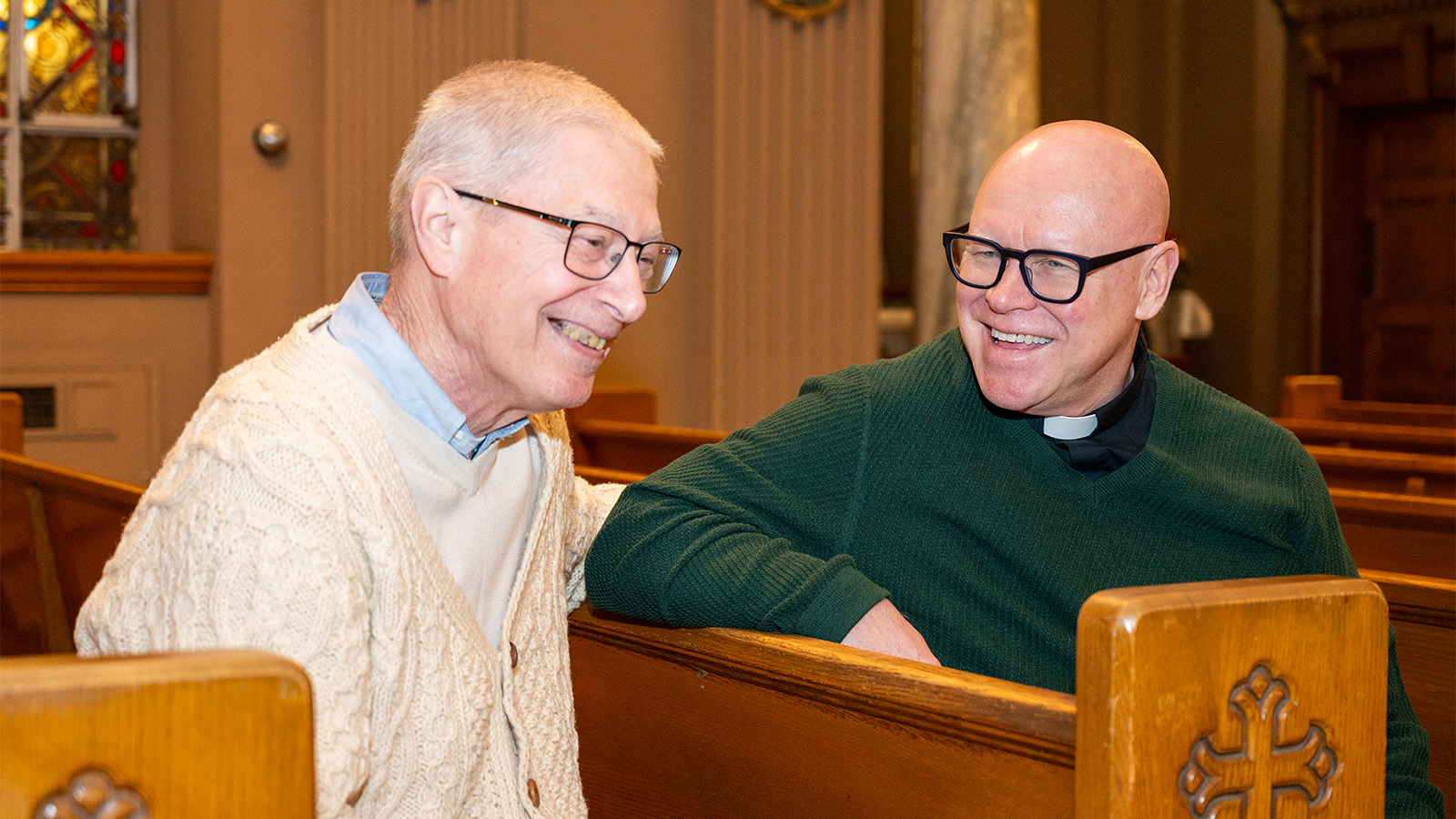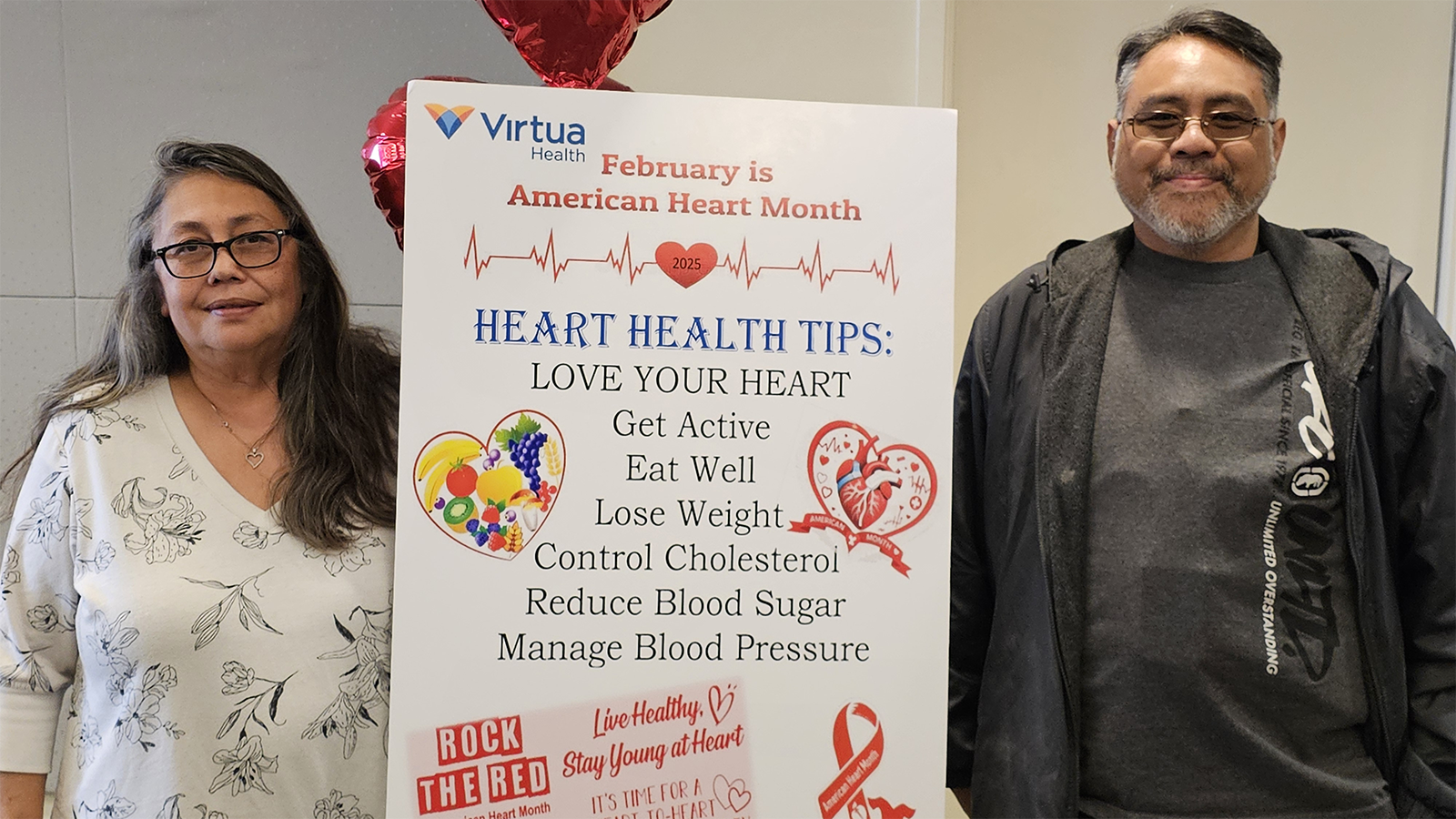CABG Surgery: What Women Should Know About Heart Health and Healing
An informative guide on CABG surgery with a focus on the unique challenges and experiences women face before, during, and after the procedure.
By Eden Payabyab, MD, Cardiothoracic Surgery
Coronary Artery Bypass Grafting (CABG) is the most common heart surgery performed in the United States, helping hundreds of thousands of patients each year. The procedure is designed to restore blood flow to the heart by bypassing blocked arteries, ultimately reducing chest pain, improving heart function, and preventing heart attacks.
But there's an important reality that deserves more attention: women often face different outcomes than men when undergoing CABG. At Virtua Health, we believe that understanding these differences is key to empowering women to prioritize their heart health and seek care with confidence.
What Is CABG?
CABG is a surgical procedure used to treat coronary artery disease (CAD) - a condition in which plaque builds up in the coronary arteries, reducing blood flow to the heart. Left untreated, CAD can lead to heart attacks, heart failure, or other serious complications.
During CABG:
- A healthy blood vessel is taken from another part of the body (like the leg or chest).
- That vessel is grafted around the blocked coronary artery.
- This creates a new path for oxygen-rich blood to flow to the heart muscle.
CABG is a lifesaving procedure and is often recommended for patients with severe blockages or multiple narrowed arteries.
Women and CABG: What Makes Their Experience Unique?
While CABG has a high success rate, research has shown that women may face a higher risk of complications following surgery compared to men. Several factors can contribute to these outcomes:
- Many women prioritize the health of their families over their own, which means they may not seek help until their condition has worsened.
- They may be older at the time of surgery. Delayed diagnosis and caregiving responsibilities often mean women undergo surgery at a more advanced age.
- They tend to have more preexisting conditions like diabetes, high blood pressure, and obesity are more common in women undergoing CABG, and these can increase the risk of complications.
- Anatomical differences such as smaller coronary arteries can make surgery more technically complex.
- Symptoms in women can be more subtle or atypical, leading to delayed diagnosis and treatment.
Know the Signs: Heart Disease Looks Different in Women
Heart disease is the leading cause of death among women in the U.S., yet it often goes undiagnosed. Classic symptoms like chest pain or pressure may be present, but women are also more likely to experience:
- Fatigue or weakness
- Shortness of breath
- Nausea or lightheadedness
- Discomfort in the jaw, neck, or upper back
- Cold sweats or palpitations
Even subtle symptoms should not be ignored. If something doesn’t feel right, trust your instincts and talk to your doctor.
The Virtua Health Approach to Heart Surgery
At Virtua Health, we care for the whole person, not just the heart. From the moment you walk through our doors, our heart care team is here to support you with:
- A coordinated care team of heart specialists and rehabilitation experts
- Personalized treatment plans tailored to your individual health needs
- Guidance before, during, and after surgery to promote the best possible recovery
- Ongoing cardiac rehab and support services to help you regain strength and confidence
Women are often caregivers, but your heart health matters just as much. The sooner you take action, the better the outcomes.
Ready to take the next step? Schedule an appointment with a cardiologist today.There's So Much More to Explore
Discover expert insights, inspiring stories, health tips, and more by exploring the content below!

Can Your Gut Health Affect Your Heart?

The Weird Pregnancy Side Effects No One Tells You About

How the Unique Stages of a Woman's Heart Affect Her Health

Complex Aortic Surgery Provides Lu’Shell Hope for the Future

Cervical Cancer Screening Guidelines: What You Need to Know

HeartTalk Magazine

How to Spot the Early Signs and Symptoms of a Stroke

How Weight-Loss Surgery Can Improve Diabetes, Heart Health, and More

Are You Eating Too Much Salt? High-Sodium Foods to Watch For

Bioidentical Hormone Replacement Therapy Pellets: Relief for Menopause and Andropause Symptoms

Why Is Sex Painful During Pregnancy? Pelvic Congestion Syndrome Explained

COVID-19 Vaccines and Pregnancy: FAQs

Don't Drink Alcohol? You Could Still Get Fatty Liver Disease

4 Exercise Tips to Help You Reverse High Blood Pressure

From Exhaustion to Empowerment: Tracy's Hormone Replacement Therapy Success Story

Timely Heart Care During a Heart Attack Helps Joe Feed the Community

Sexual Health FAQs: The Questions Everyone’s Too Embarrassed to Ask

3 Reasons Why Now's the Time to Find Relief From Varicose Veins

Young Breast-Cancer Survivor Has New Hope for Healthy Future

What To Know About Vaginal Discharge During Pregnancy

Tara's Story: From Debilitating Uterine Fibroid Pain to a Half-Marathon Medal

Is Your Post-Pregnancy Belly Bulge a Sign of Diastasis Recti?

Your Guide to Mammograms: When to Get Screened and What to Know

Healthy Weight Gain During Pregnancy: A Guide for Moms-to-Be

Lifesaving Heart Care Creates a 'Bond That's Never Left Us'

How High Blood Pressure Affects Your Body

Not Just for Wrinkles: Botox Injections Promote Improved Bladder Control

Caring Maternity Team Transforms Harley's Pregnancy Crisis Into Lasting Memories

Robotic Hysterectomy, Trusted Care Help Bobbi Shine Again

How to Have a Healthy Pregnancy if You're Overweight

4 Surprising Health Truths You Should Know

5 Interesting Facts About Your Heart

Is Low Sex Drive Normal? Revealing the Complex Causes of Low Libido in Women

Get to the Bottom of Blood Pressure Numbers

CABG Surgery: What Women Should Know About Heart Health and Healing

When to Take Action for a Stronger Heart

Stress Incontinence vs. Urge Incontinence: What's the Difference?

4 Foolproof Pelvic Floor Strengthening Exercises for Women

What to Expect During Perimenopause

Groundbreaking Renal Denervation Procedure Controls a Lifetime of High Blood Pressure

Patient Story: LVAD Mechanical Pump Strengthens Michael's Heart Function

4 Ways to Stay Fit and Healthy on a Budget

Do You Know the Signs and Symptoms of Uterine Fibroids?

How Are Uterine Fibroids Treated?

Can I Have Sex After a Hysterectomy?

Mitral Valve Surgery Keeps Yaneth Living the American Dream

What to Expect From a Robotic Hysterectomy

When You Need A Hysterectomy Know Your Options

Take Control of Incontinence, Prolapse, and Other Pelvic Floor Disorders

How Can I Prevent Bone Loss and Osteoporosis?

The Truth About Menopause, Weight Gain, and Belly Fat

Shedding Light on Lesser-Known Menopause Symptoms and Solutions

Debunking The Myths About Vaginal Dryness
Inside Look at Blood Vessels Aids PAD Treatment
Denise Davis: Pay Attention to Your Heart Health

Sweet Music: Trust, Teamwork Save Justin from Heart Attack

Advanced Minimally Invasive GYN Surgery Puts You at the Center of Care

Complex Heart Surgery Nets James a Lifelong Friend

Colitis Symptoms Under Control, Jennifer Is ‘Living My Best Life’

Surprising Symptoms May Signal Stroke In Women

8 Key Steps to Better Blood Pressure Control

The HPV Vaccine: A Powerful Shield Against Cervical Cancer

How Does Breast Density Affect Your Mammogram?

Menopause: New Insights Into the Power of Hormone Replacement Therapy

How to Prevent and Treat Urinary Tract Infections

Signs You Should Get Treated For Vein Problems

One New Heart Valve Saves Two Lives in the Tritten Family

What You Need to Know About Heart Failure

6 Numbers Key to Keeping Your Heart Healthy

Breast Cancer Diagnosis Inspires Catherine to Help Others

Five Mindfulness Tips That Can Help Heal Your Heart

Watchman Heart Device: a Technological Breakthrough for Blood Clot Prevention

Albert's Emergency Cardiac Surgery Is a 'Story of a Lifetime'

Love Your Heart: Essential Care Tips for Every Stage of Life

How Do I Measure My Blood Pressure at Home?

How Do I Improve My Cholesterol Levels?

3 Ways to Reduce Your Stroke Risk
Advanced Heart Failure Therapies Get Bernadine Back to Full Speed

Sarah Wins Back Her Health After Crohn's Disease Diagnosis

A Breast Self-Exam Saved Kristen's Life

How Sex Keeps You Healthy as You Age

Protect Your Child From HPV and Related Cancers

Why IUDs Might Be The Most Effective Birth Control

5 Things You're Too Embarrassed to Tell Your OBGYN

4 Not-So-Crazy Questions to Ask Your Doctor

Keeping the Beat: Advanced Heart Surgery for Aortic Aneurysm

Heart-Healthy Summer Recipe: Hummus and Veggies

4 Delicious Heart-Healthy Recipes Perfect for Summer

Heart Healthy Summer Recipe: Dessert Parfait

Heart-Healthy Summer Recipe: Pear and Walnut Salad

Heart-Healthy Summer Recipe: Terrific Turkey Burgers
Atrial Fibrillation and Stroke: What's the Connection?
Heart Tests Your Doctor May Order
Managing Pregnancy for Mothers With Heart Conditions

Heart Healthy Recipe: Basil Pesto Pasta With Seared Vegetables

Heart Healthy Recipe Chocolate Avocado Chia Pudding
Keep Your Heart Rhythm in Check With Your Smartwatch
Mind Your Meds for Blood Pressure Risks
Magic Pill for Heart Health? Cut 300 Calories a Day
3 Smart Ways to Boost Your Heart Health
3 Best Exercises For Heart Health

Get Your Heart Pumping With These 25 Workout Songs
Your Chest Pain: Heartburn, Heart Attack, or Something Else?
3 Heart Healthy Recipes to Win Valentines Day
How Work and Home Stress Can Affect You
Why Improving Your Health Is Going To The Dogs And Cats
Why Younger Women Need Start NOW To Safeguard Their Hearts From Heart Attacks
Can You Die of a Broken Heart?
Mitral Valve Surgery Opens Doors for Improved Quality of Life
6 Healthy Habits to Start in Your 20s for Better Lifelong Health
Do You Have a Fatty Heart?
Get Pumped! Assist Devices Can Improve Heart Failure Symptoms
A Cardiologists Advice on Heart-saving Emergency Cardiac Care
Virtua Doctor’s Experience Is a Warning for All About COVID-19 and Strokes
You May Feel Fine, but Gregory Says "Don't Skip Your Medical Care"
In Sickness and in Health: Couples Often Share Heart Disease Risk
"Reduce Your Heart Disease Risk With a Plant-based Diet"
Hybrid Robotic Heart Surgery and Valve Replacement Restores Quality of Life
Can Marijuana Hurt Your Heart Health?
6 Tips for Restoring Your Heart Rhythm
Eat Smart for Your Heart
Cardiac Rehab: Strengthening Your Heart After Leaving the Hospital
Your Heart Needs A Good Nights Sleep
Are You at Risk for AAA—the Silent Killer?
The Cardio Oncology Team Protects Your Heart During Cancer Treatment
Get Relief From Painful Varicose Veins This Summer
Exercise Your Way to a Stronger Heart
Fish Oil: A Good Catch or a Scam?
My Heart Seems to Skip a Beat - Should I Be Worried?
Menu Planning? Try These 5 Heart-smart Substitutions

5 Health Risks Tied to Weight

